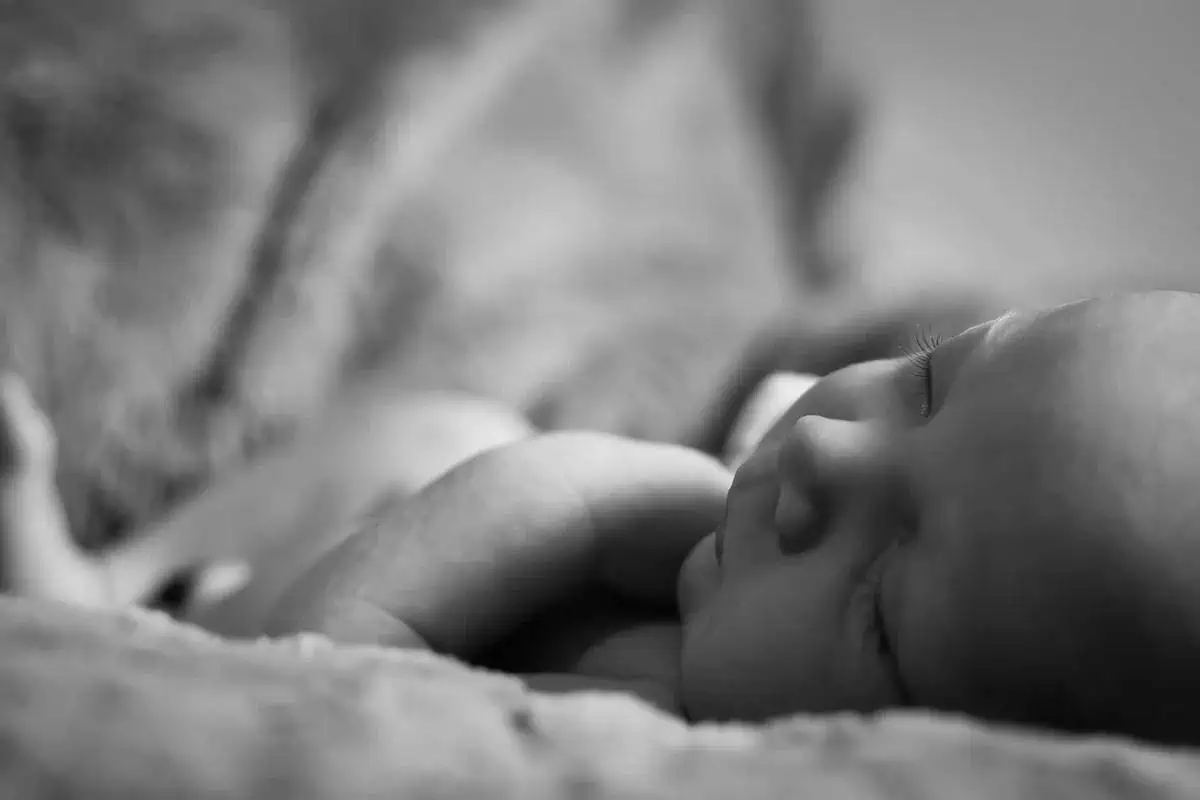As a sleep consultant, I hear the term “regression” used to explain every imaginable situation. If a baby doesn’t sleep well for a couple of nights, parents start dropping the ‘R’ word. Most parents are led to believe that there’s an 8-month regression, a 9-month regression, a 1- AND 2-year regression, growth spurt regressions, ‘leaps’ and so on. Sure, there are lots of factors that can affect babies and their sleep but, in all honesty, they aren’t all “regressions.” The 4-month regression is the real deal! It’s a time when babies are making permanent changes to their sleep, and it is actually a good thing!
To understand what’s happening to your baby at this time you need to know a few “science-y” things about sleep.
Many of us just think of sleep as an on-or-off situation, you’re either asleep or you’re not. But sleep has a number of different stages, making up the ‘sleep-cycle.’ We all go through these different stages of sleep multiple times a night.
Stage 1 is the initial stage where you can just feel yourself nodding off but don’t really feel like you’ve fallen asleep. This is when you have told your partner to go to bed when you catch them dozing off in front of the TV to only be told “I wasn’t sleeping!”
Stage 2 is considered the first “true sleep” stage. This is where people tend to realize, once woken up, that they were actually sleeping. If you are fortunate enough to be able to take a “power nap,” this is as deep as you want to go, or else you’re going to wake up dazed.
Stage 3 is deep and regenerative sleep, AKA “slow wave” sleep. This is where the body starts repairing and rejuvenating the immune system, muscles, energy stores, and stimulates growth and development.
Stage 4 is REM (rapid eye movement) sleep. This is where the brain starts to consolidate information and memories from the day before, we do most of our dreaming when in this stage.
Once we’ve gone through all the stages, we either wake up or come close to waking up and then start all over again until the alarm goes off.
What does this have to do with the dreaded 4-month regression?
Newborn babies only have 2 stages of sleep; NON-REM (stage 3) and REM and they spend about half their sleep in each stage. But at around 4 months, they reorganize their sleep and develop the 4-stages.
When this development takes place, babies move from 50% REM sleep to 25% REM to make room for the first two stages. REM sleep is a light sleep but not as light as stage 1 and 2 sleep, therefore 4 month(ish) old babies are spending more time in lighter sleep and so there is a higher chance of waking up!
Now, waking up between the stages of sleep is completely natural and we cannot prevent or avoid our babies waking up. As adults we tend to wake up 3-5 times through the night and we’re able to recognize that we are still in our bed, it is still night time, there are no monsters lurking under the bed and so, back to sleep we go.
A 4-month-old baby unfortunately lacks these critical thinking skills. To a 4-month-old baby who fell asleep at Mum’s breast or in her arms, the wake-up thoughts could be more like “Goo goo, gah gah, the last thing I remember was Mum’s face and warm arms, there was milk and a song about Twinkling Stars and now I’m alone in this dark room, there’s no milk, and there’s probably three scary monsters underneath this bed.”
That’s probably an exaggeration but we don’t actually know what goes on in a 4-month old’s mind.
Anyways, now that your baby has suddenly realized that Mum’s not around and they’re not entirely sure where she has gone, the natural response is to do a little freaking out which stimulates the fight-or-flight response. Now baby’s not going back to sleep without a significant amount of reassurance that everything is OK.
The other major contributor to the 4-month shambles is that up until this point, parents have either been putting their baby to sleep with a dummy, rocking, breastfeeding or using some technique to help their baby get to sleep. Now that baby’s spending more time in light sleep and is more likely to wake up, this suddenly becomes a much bigger issue. These sleep props or sleep associations are a double-edged sword. They are so helpful in getting babies to drift off to sleep BUT when they wake up, they cannot get back to sleep without them.
There is good news for anyone experiencing the feared 4-month sleep regression. A regression is defined as “reversion to an earlier mental or behavioral level,” which is exactly the opposite of what your baby is experiencing, and it should be named the 4 month sleep PROGRESSION!
Now for the big question, what can you do to help your baby adjust and embrace this big sleep development?
-Make the room dark, really dark! You might think that the room is dark enough or that your baby fears the dark and needs a nightlight. NO. Tape garbage bags over the windows if you must or cover them with al-foil (just be prepared to explain it to the police when the neighbours accuse you of running a drug lab).
Newborns and infants are not afraid of the dark, however they are very sensitive to light. Light tells their brains that it’s time to be awake and then the brain secretes hormones accordingly, so we want to keep that room completely pitch-black during naps and bedtime.
-The other archenemy of daytime sleep (and sometimes nighttime) is noise. It could be the doorbell, the dog barking at the postman, or your neighbour 3 doors down mowing their lawn. When the baby is spending more time in lighter sleep, any noises will startle them easily and wake them up.
Instead of headbutting the postman, the dog and the neighbour, utilize white noise in babies’ room to drown out these environmental noises. And yes, in a way this is also a “prop,” but it is considered a good prop. It doesn’t require parental presence, it’s just there and it can be on as long as baby’s sleeping.
-Bedtime routines are also an essential component to getting your baby sleeping well.
Try to keep the routine simple, only about 4-5 steps and don’t end it with a feed or you risk baby nodding off at the breast or the bottle and that will create that “feed to sleep association.” Keep the feed near the beginning of the routine. The whole process should last 20-30 minutes and baby should go into their cot awake. If you’re noticing your baby getting fussy before bedtime, you’ve probably missed the sleep boat. 4-month-old babies should really only be going about two hours between snoozes and bedtime should be between 6-7pm.
There are going to be other regressions throughout your child’s youth. All sorts of things can cause your little one to have a few bad night’s sleep, e.g., travelling, sickness, teething. But the 4-month regression/progression is a one hit wonder! Once they have hit this there will be four glorious stages of sleep repeated multiple times a night.
Parents need to teach them the skills they need to link those sleep cycles together independently, without nursing or rocking. If you give your baby the chance to develop and learn this skill, you’ll have given them a gift that they’ll enjoy for the rest of their young lives.
Of course, some kids are going to take to this process like a fish to water and some are going to be a little more resistant. If your baby is a fish, count yourself as lucky, take delight in your success and gloat about it on Facebook if you wish.
For those of you with the resistant baby, I’m happy to help so we can then brag on the socials together. As soon as you are ready to get your baby sleeping through the night, I am ready to support you.
Related Posts
16 August 2023
Why Does Your Baby Wake In The Night?
16 August 2023
5 Common Myths About Baby’s Sleep
16 August 2023




